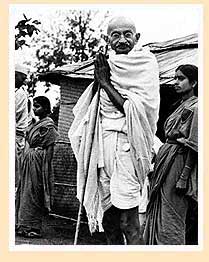
Gandhi was visibly depressed during his last days.
According to political psychologist Ashis Nandy:
Did Gandhi know what he was doing?“If Gandhi in his depression connived at it, he also perhaps felt- being the shrewd, practical idealist he was-that he had become somewhat of an anachronism in post-partition, independent India; and in violent death he might be more relevant to the living than he could be in life. As not a few have sensed, like Socrates and Christ before him. Gandhi knew how to use man’s sense of guilt creatively.”
He once said:
“I find no parallel in history for a body of converts and their descendants claiming to be a nation apart from the parent stock. If India was one nation before the advent of Islam, it must remain one in spite of the change of faith of a very large body of her children”
Gandhi in “Jinnah of Pakistan” by Stanley Wolpert, New Delhi 1985(1st edn 1984) page 232-3.
Ironically, the same line became a battle cry for BJP in the 90s.

A question I have heard a lot of people ask:
ReplyDeleteWhere was Gandhi at the time of Independence?
Where was Gandhi when India made its “Tryst with Destiny”?
Gandhi was at a place called Noakhali in East Bengal, on the eve of Independence. Noakhali was witness to macabre killings with Hindus and Muslims butchering each other. Gandhi, going against all advice and odds, went to the center of this mindless violence and was pacifying the rioting crowd on the first eve of Indian Independence. People at first abused him but slowly the tide turned.
There were no reports of rioting in Noakhali while he was there.
Noakhali now in Bangladesh still suffers from chronic communal frenzy.
‘ Gandhiji, it has been well said, could fashion heroes out of common clay. His first, and, undoubtedly, his most successful experiment was with himself.’
ReplyDelete- J. M. Upadhyaya(principal at the high school in Rajkot where Gandhi had spent seven years. In 1965, his book Mahatama Gandhi as a Student was published that told the story of the student life of Gandhi and in true Gandhian tradition even gives the reader access to a rather mediocre Marks Card of Gandhi. Read more at Ramachandra Guha’s write up about Gandhi’s student years)
-0-
On 30th Jan, I noticed a curious phenomena that may have a lot of explanations but it is curious nevertheless. My little blog found a lot of traffic for a post that I did on Nathuram Godse’s story
ReplyDeleteand yet not a single hit for this post.
Strange.
Anyway something about most famous and celebrated cinematic depiction of Gandhi’s life(and death): Richard Attenborough’s Gandhi(1982).
The film is no history but a fine movie that has etched its version of history into our minds by its repeated annual, bi-annual telecast. This year also, Doordarshan telecasted the movie on 26th Jan (it is usually telecasted on 15th August, so maybe this year it would be telecasted twice or maybe the broadcasters would choose from choices available by now like: Jahnu Barua’s meditative Maine Gandhi Ko Nahin Mara (2005) Shyam Benegal’s under rated “The Making of the Mahatma (1996)” and Firoz Khan’s private Gandhi in “Gandhi my father (2007)” Kamal Hassan’s well ahead of its time “Hey Ram (2000)”, Jabbar patel’s epic “Dr Ambedkar” and Ketan Mehta’s “Sardar” with a fine performance by Paresh Rawal as the Iron Man of India, bunch of action movies about Bhagat Singh, Raju Hirani’s modern takes on comic Gandhism “Lage Raho Munna Bhai ”, and Rakeysh Omprakash Mehra’s lessons in Pop historics “Rang De Basanti”. Quite a lot to choose from!).
One of the myths immortalized in the movie is: mahatma Gandhi uttering the words ‘ Hey Ram’ as his last after being hit in the chest three times by the bullets fired from a primitive pistol by the lone (Agatha Christie addicted) assassin Nathuram Godse.
A Sikh businessman called Gurbachan Singh who witnessed the assassination later claimed he died with an invocation to Lord Ram on his lips, a myth that is now generally accepted. His (Mahatma Gandhi’s) actual last words were the equally characteristic: ‘It irks me if I am late for prayers even by a minute.’
So informs Patrick French on page 360 of his excellent book Liberty or Death: India’s Journey to Independence and Division
Patrick French quotes his source as Gandhi, M. K(2), The Collected Works of Mahatma Gandhi, vol. XC p. 436.
Only a noble slave could have propounded this doctrine, a slave who is too weak, too modest and too passive to break his chains. It was this servile complexion of Gandhism which created the dangerous possibility of it being rejected by the very people for whom it was intended.
ReplyDelete- Nirad C. Chaudhari on ‘nonviolence’ in his Autobiography of an Unknown Indian